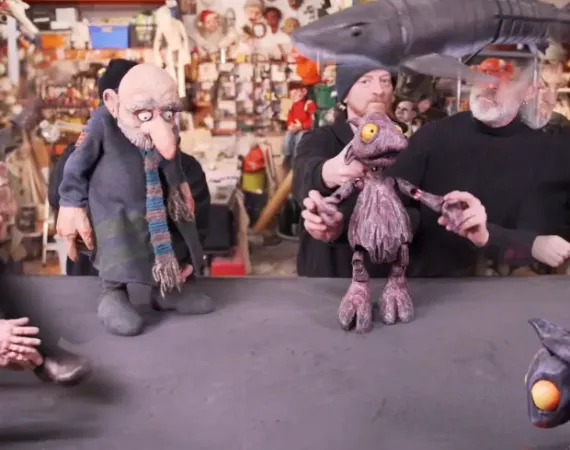Deadline for entries
Mon 23 Sep 2024 - 10:00
MyWorld Fellowship in residence at Black Laboratory: Alternative communication via remote talking puppets

An opportunity to spend six months working with Black Laboratory, an award-winning animation and development studio to investigate using remote puppetry to develop indirect conversation tools for people with alternative communication preferences.
You will be exploring the potential of non-human puppet/animation characters as communication aids or facilitators, working with people who are diagnosed or self-identify as Autistic or with Autism Spectrum Disorder (ASD) and experience significant barriers with face to face communication.
We recognise that ASD is clinical language and does not resonate with everybody, see note on terminology further down this page.
You will be using puppix® puppets to trial ways in which they can overcome barriers to face to face communication, whether in person or online.
We will award one person £12,000 for six months at 2.5 days/week based at Black Laboratory and the Pervasive Media Studio.
Who is the Fellowship for?
This MyWorld Fellowship is aimed at freelancers, practitioners, industry, and academics who have industry or practice-based experience and are based in the West of England. We invite people to think about these Fellowships as a period of collaborative thinking, innovation and experimentation, applying practice, expertise or relevant experience.
The Fellow will be contracted and paid via the University of Bristol but managed by Watershed and the Fellowship host, Black Laboratory. This Fellowship is part of the MyWorld IDEAS programme, funded by UKRI. Read more about MyWorld. This Fellowship is hosted by one of the teams from the second MyWorld CR&D Call led by Digital Catapult.
How to apply
- You are invited to answer five questions on an online form focusing on how you meet the criteria for the Fellowship in residence and eligibility.
- Shortlisted applicants will then be invited to interview with members of the MyWorld partnership and Black Laboratory.
MyWorld believe our work will be stronger with greater diversity and welcome applications from those who are currently underrepresented in the culture, technology and higher education sectors. We understand that each of us brings our experiences, our backgrounds and our own unique lens to what we do so no one is expected to represent any specific groups.
Find out everything you need to know about the theme, the opportunity, the application process, timeline and FAQs here:
Fellowship in Residence brief (Large Print)
Notes on terminology:
We recognise and understand that there is no consensus among Autism communities about how people would like to be referred to. There are many people who prefer identity first, i.e. Autistic, and many people who prefer to state that they ‘have Autism’. We also know that some people prefer to stick to the DSM-5 diagnostic criteria and refer to themselves as people with Autism Spectrum Disorder or people on the Autism Spectrum. Some people have been diagnosed before 2013 and might have been diagnosed as having Asperger Disorder or Syndrome. We also know that for some people ‘Neurodivergent’ is preferred.
For the sake of clarity, we are describing people as follows: ‘people who are diagnosed or self-identify as Autistic or with Autism Spectrum Disorder and experience significant barriers to face to face communication.’ This could mean (but is not exclusive to) Autistic verbal or non-verbal people who have a support worker to help with specific communication barriers.
Closing Date: Mon 23 September, 10:00 BST